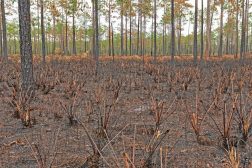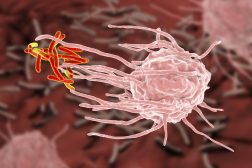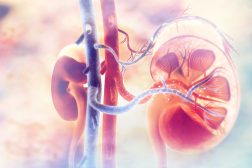Definition
noun, plural: telocentric chromosomes
A chromosome whose centromere is placed very close to the end of the chromosome
Supplement
The centromere is the dense, constricted region in a chromosome. It contains highly-specialized repetitive DNA sequences (e.g. satellite DNA) that are packaged into heterochromatin. The centromere serves as the site for kinetochore assembly and therefore it is essential during the alignment of the chromosomes at the metaphase plate and the subsequent segregation of chromosomes during cellular division. The presence of the centromere results in the characterization of the chromosomal arms. The arm that is relatively shorter is called p whereas the one that is longer is called q. Based on the position of the centromere, the chromosome may be described as metacentric, submetacentric, acrocentric, telocentric, subtelocentric, and holocentric.
A telocentric chromosome is a chromosome whose centromere is located at one end. The centromere is located very close to the end of the chromosome that the p arms would not, or barely, be visible. A chromosome that has a centromere closer to the end than the center is described as subtelocentric.
Both telocentric and subtelocentric chromosomes have not been observed in humans.
See also:
Dictionary > Telocentric chromosome
You will also like...

Ecosystem Succession
If the balance of nature is left untouched, landscapes can change dramatically over time. A previous ecosystem is supers..

Still Water Community Plants
This tutorial looks at the adaptations of freshwater plants for them to thrive in still water habitats. Familiarize your..

Neural Control Mechanisms
Neurons generate electric signals that they pass along to the other neurons or target tissues. In this tutorial, you wil..

Biological Cell Defense
Organisms employ different strategies to boost its defenses against antigens. Humans have an immune system to combat pat..

Dominance
This tutorial presents Gregor Mendel's law of dominance. Learn more about this form of inheritance and how it can be pre..

Homeostasis of Organism Water Regulation
Osmoregulation is the regulation of water concentrations in the bloodstream, effectively controlling the amount of water..

